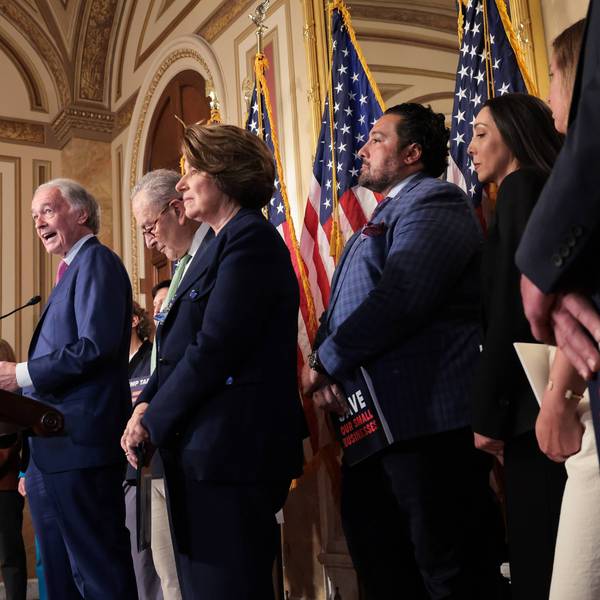Trump's rhetoric of America First and Make America Great Again are evocative and form great bumper stickers. But these slogans don't quite encapsulate all of the Trump movements' analysis of either the cause of or proposed solutions to our current economic problems.
Though some people have used the term "National Capitalism" more loosely (there is even a fascist National Capitalist Party!), I will use it as an overarching concept that attempts to crystallize Trump's economic rhetoric. Strikingly, the term is also used as a way to highlight similarities to and differences from the National Socialism of Germany in the 1920s-1930s.
According to Trump's National Capitalist perspective, the cause of our problems is the "other." In this framework, "they" are to blame for "our" problems. The "other" includes immigrants from non-European countries; those who do not conform to the dominance of white, Christian, patriarchal, heterosexual and religiously conservative values and actions; and the governments of other countries. The "other" also includes a globalist elite that is said to dominate international finance, the federal government, the media and the Washington, D.C. establishment (note the anti-Semitic code words). Hence, Trump's appeal to those who feel--and have been--left out of the benefits of economic growth but also to white nationalists, anti-LGBTQ factions, conservative Christians, anti-Semites, anti-Muslims, and nativists.
"Trump's CACAnomic policies will exacerbate rather than solve the economic problems faced by the mass of Americans."
Trump's National Capitalist attack on the "other" has many parallels to the rhetoric of German National Socialism. The German Nazis used the term untermenschen (inferior peoples) to degrade the "other"--especially Jews, Roma, Slavs, other non-Aryans, LGBTQ, leftists, unionists, intellectuals, the disabled and other countries. These groups were blamed for the recurring economic and political crises Germany experienced following WWI. Trump's attack on the untermenschen is often less direct than the rhetoric of National Socialism. But the substance of the rhetoric is similar in both cases: it dehumanizes the "other" as a way not only to elevate and give a "voice" to a white, paternalistic, alienated and nationalistic base but also to "divide and conquer" the mass of working families based on differences of race, class, sexuality, religion and national origin.
The rhetoric surrounding the policy solutions offered by German National Socialism and Trump's National Capitalism are quite different. Nazi rhetoric focused on subordinating the interests of the individual, corporations and private property to the interests of the nation state; the nationalization of particular industries; and the expansion of social programs. There also was a strong anti-capitalist strain in Nazi rhetoric in its formative years. Trump's version of National Capitalism subordinates the power of the nation state to the interests of individuals and corporations; the sanctity of private property; the privatization of national resources; the deregulation of particular industries; and the reduction or elimination of social programs. However, the policy rhetoric of both National Socialism and National Capitalism rely on a strong leader while initially using the power of the government to limit the "other" through deportations, voter suppression, and greater "freedom" to discriminate.
Trump's rhetorical policy solutions are firmly rooted in the homeland and capitalism--hence the relevance of "national capitalism." The goal is to get the "other" off "our" backs to unleash the forces of American ingenuity, innovation, profit making and job creation. For those who feel immigrants are taking U.S. jobs and reducing wages, Trump states that he will build a wall, deport undocumented immigrants, and severely limit immigration from non-European countries, especially Mexico, Central America and Muslim majority countries. For those whose jobs were, or are threatened to be, shipped to other countries, Trump promises to renegotiate trade agreements and punish the offending companies. For those who feel that government is the problem, Trump states that he will deregulate, defund and privatize. For those who feel threatened by elites, Trump bullies the media and promises to drain the swamp. For those who fear other types of people who they believe benefit from unfair government advantages, Trump pledges to remove any anti-discrimination protections for non-whites, the LGBTQ community, and non-Christians.
Trump actually follows through on some of these promises but not on others. It all seems haphazard. But there is a core set of policies that Trump has consistently supported and proposed. These economic policies can be defined as CACAnomics - an acronym for Corporate Agenda (CA), Cronyism (C) and Authoritarianism (A). The Corporate Agenda is firmly rooted in the interests of global corporations especially those associated with Wall Street--cut taxes primarily on large corporations and the wealthy, selectively manage deregulation and regulation, cut government spending on social programs, and privatize government programs and resources--all to benefit large multi-national corporations. Trump's Cronyism re-enforces the corporate looting of the public trough. And his Authoritarianism not only represents a threat to democracy but the calcification of a corporate state. I plan to examine CACAnomics in much more detail in another article.
There will be a widening gap between Trump's economic rhetoric and the economic policies he has proposed. Trump's CACAnomic policies will exacerbate rather than solve the economic problems faced by the mass of Americans. We have almost 40 years of experience with the Corporate Agenda that started with the deregulation efforts of President Carter and was adopted by each subsequent President and Congress with varying degrees of emphasis on its component parts. We have learned that it is a mechanism not only for the historic transfer of income, wealth and opportunity from the 99% to the 1% but also for the instability and crises associated with the boom and bust bubbles generated by an unleashed Wall Street. Trump's version of the Corporate Agenda is distinct from previous Presidents because of his audaciousness, crassness, vitriolic rhetoric and his attempt to institute the Corporate Agenda in full, rather than in parts like his predecessors. Trump also could benefit from the conservative corporatist majorities in the U.S. House and Senate that agree with the overall schema if not the particulars of each of Trump's economic policy proposals.
Trump's response to the coming failure of his policies to make life better for most Americans will be significant. Here are two of many different scenarios.
One chilling possibility is that Trump and his allies will take steps to create a more authoritarian regime by blaming and attacking others for his policy failures. Trump's national capitalist rhetoric has set the stage for this by making it increasingly acceptable or normal to attack and blame the "other." This is another similarity between the rhetoric of Trump's National Capitalism and German National Socialism--"normalizing" the attack on the "other" makes it easier to justify previously unpopular policies. Opportunities, whether contrived or actual, will occur that Trump and his allies could utilize to further consolidate power: a terrorist attack in the U.S., a foreign crisis, or an economic crisis. Trump would probably be amenable to such a scenario if he determines it is needed for his political survival. After all, Authoritarianism is a key component of Trump's policy of CACAnomics. Such a scenario is not farfetched--the power of the President allied to a pliant corporate media has been used to implement policies that the public would otherwise not support. Here are just a few examples: the Gulf of Tonkin incident was used to galvanize support for the Vietnam War; the Weapons of Mass Destruction were used to justify the invasion of Iraq; and the use of the never-ending War on Terror has been utilized to rationalize the expansion of the surveillance state and the erosion of civil liberties.
Another scenario is that Trump loses support and is succeeded by another set of politicians who--whether Democrat or Republican--continue to follow the failed corporatist policies that have dominated the U.S. and global economies for a generation. In this case, we will suffer a continued period of malaise characterized by multiple political and economic crises that further alienate vast swaths of our population. This, in turn, could set the stage for a more organized, effective demagogue in the future (a path already "normalized" by Trump's rhetoric) or a country increasingly weakened and divided between class, race, geography and ideology.
However, we do not have to accept a future defined by the rhetoric of national capitalism or the failures of CACAnomics. The primary way out of the impending morass is not only to address the foibles of our politicians but, more importantly, to take on a power structure dominated by global corporations, Wall Street and the super wealthy. After all, they are the principal creators, supporters and beneficiaries of CACAnomics. The failure of their policies set the stage for Trump who has skillfully used the rhetoric of National Capitalism as a cover to further extend these same destructive policies. It is now up to us to create a unified progressive movement that offers a truly democratic alternative to corporate hegemony and creates the power to enact that alternative--a topic for another day.



